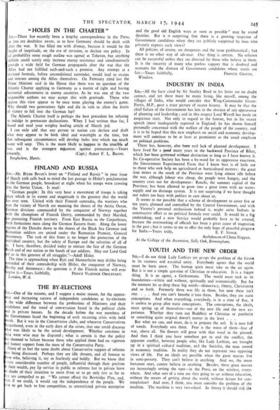THE BY-ELECTIONS
ta,—One of the reasons, and I suggest a major reason, for the appear- e and increasing success of independent candidates at by-elections the wide difference between the professions of Ministers and their ndidates and the trend of conversation heard in the political clubs d in private houses. In the decade before the war members of e Government faced the beginning of each recurring crisis with bold ords. But it was in the Conservative clubs, and wherever Conservatives egathered, even in the early days of the crises, that one could discover hat was likely to be the actual development. Whether sanctions in 934 were wise may be disputed ; what is certain is that the policy as doomed to failure because those who applied them had no vigorous d honest support from the mass of the Conservative Party. Many of us feel the same doubt about Conservative support of reforms ow being discussed. Perhaps they are idle dreams, and all honour to use who, believing it, say so fearlessly and boldly. But we know that very considerable number of people, influential through their position their wealth, pay lip service in public to reforms but in private leave o doubt of-their intention to resist *ern or to go only just as far as Cy are compelled to go. " We cannot afford the Beveridge Plan, and, en if we could, it would sap the independence of the people. We ye to get back to free competition, to unrestricted private enterprise and the good old English ways as soon as possible " may be sound doctrine. But is it surprising that there is a growing suspicion of Government candidates when they are publicly supported by men who privately express such views?
All policies, of course, are dangerous and the issue problematical ; but there is no other way of advance. One thing is certain. No reforms can be successful unless they are directed by those who believe in them. It is the sincerity of many who profess support that is doubted and accounts for the distrust of Government candidates whose words are


























 Previous page
Previous page